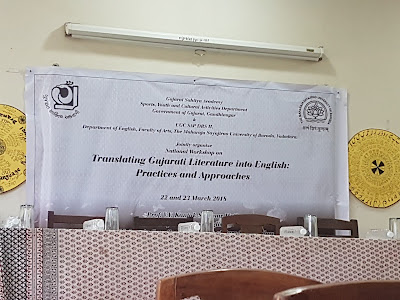Hello Readers,
This is the continuation of the previous blog...
Day 2
The
refreshing day began at 10.00 Am with great zeal and energy.
· Session 1 -
The first
session was again a special one. The participants were divided into small groups
as per their choice of translating poems or prose. They had to work in groups
and translate the poem or prose given to them on the previous day.
My Group
I and my
group had taken different poems for this task. Ms Neela Pandya and Prof.Santosh
Dash helped us a lot in this
task. They also checked our work and gave suggestions regarding it.
The above poem was taken by me. This was the best session for me because in this session
I was able to put into practice what I learnt.
· Session 2 -
Subject
experts- Prof.Sachin
Ketkar and Dr Santosh Dash shared their expert views on Translating Gujarati
Literature into English in this gathering. Both the experts shared their
experiences as a translator.
Dr Dash opined that Translation is a
process of ‘Give’ and ‘Take’. He also talked about a quite new concept that Implementation of an Idea is also a translation. This was quite a new definition of translation. Sir has been involved in translating literature
for a long time. His purpose is not only
to give Gujarati Literature into another Language but also to know the people
in deep.
Prof.Ketkar started
his journey from his college time. He used to translate stories and poems from
that time onwards. He took it as a serious profession after that. One of the
most important things he talked about was ‘Sense
of Failure’. Whenever he used to
read his own translation he felt like it’s disastrous. According to sir
this sense of failure keeps you growing over time.
People many times doesn’t like or want to translate
thinking that the translation will lose the charm of the original text. As per
Sir, there is no loss. There is no
universal idea of loss. In this process, someone gains something but no one
losses anything. This was a unique idea of loss.
Sir then shared about 3 models of translation given by
the well-known Marathi translator and poet Gyaneshwar Sir in the 13th century.
Prof.Ketkar Sir’s has done much work on this poet and his work.
This session
was very productive. Listening to the journey of these experts bring in vital
energy for us to keep learning and growing.
· Session 3 -
Like all the
other sessions this was again a good session. In this, the participants who had
done their work in this area shared their experiences.
Ms Sadhna Desai has translated many books from English into Gujarati. She
said that many times when we read certain books we feel like it is for kids as
the norms are attached to it, but then we realize that it is meant for adults.
For example - Gulliver’s Travels etc. She also translated many stories into Gujarati.
Ms Pooja Mehta has done her translating work on Hari Vallabh Bhayani’s
books. These books were the translation of a translation. She said that it was so
difficult task to do and many of the words she had to retain in the original
language. She said that while doing this she realized that being a Gujarati her
language was so poor. She also said that it is necessary to know more than two
languages that are too deep.
Ms Pankti Desai started her journey as a translator during school as a
process of language learning. She has done her MPhil in Translation Studies.
She translated many short stories. Among them, she read her translation of a
short story by Mona Patrawala. She retained the words as in the original
dialect to give the feel of the people and their Parsi culture.
Lastly, Mr Mrunal
Chavda shared about his Project on Gujarati
Literary Production in South Africa: Themes and Strands.
This project reminded
me of a famous line-
We got to
know here how different people faced different problems in their journey as a translator.
For a fresher
like me, it was altogether a new, Productive and wonderful experience.
On the first day, we had
discussed the story ‘GruhPravesh’ by Suresh Joshi. This word is associated
mostly with the girls entering a new. I had the same feeling while entering into
this new world of translation where everyone experts as well as participants
not only warmly welcomed me but also appreciated my work and encouraged me to
keep writing, learning and growing.
This
wonderful workshop ended with the valedictory function and distribution of
certificates and a book as a token of love.
As it is said,
"भूखे-भजन-न-होए-गोपाला"
No work can
be done without food. The food at the workshop was delicious and relishing.
It is very
necessary to have a positive eye-soothing atmosphere to learn something new.
Thanks to the students of the Department of English, MSU for providing us knowledge through different beautiful projects on
the display.
I extend my heartfelt gratitude towards Prof.Sachin
Ketkar, Prof.Hitesh Raviya, Prof.Madhurita Choudhary, Dr AjaySingh
Chauhan. Thank you, Mr Dhiren Parmar and
Mr Parth
Dave for helping us these two
days.
Looking
forward to such events in future!!!!!!
For my first
experience as a translator…..Stay tuned to read my next blog!!!!











Comments
Post a Comment